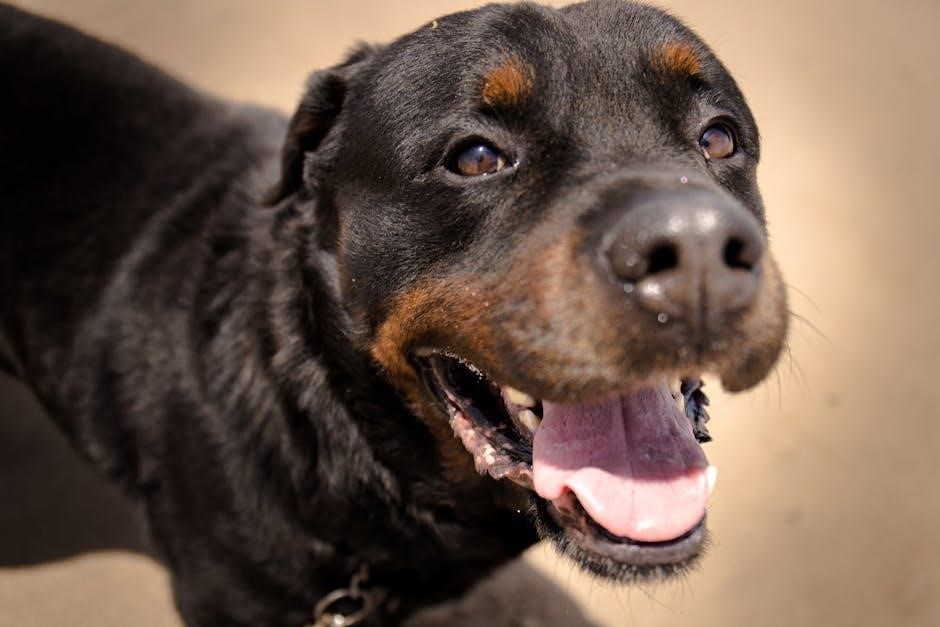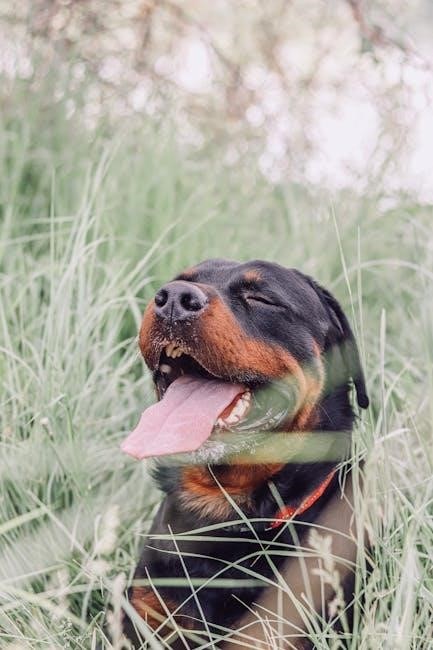Welcome to our guide on feeding your Rottweiler puppy! Proper nutrition is essential for their growth and health. Learn how to provide a balanced diet tailored to their needs, ensuring they thrive during their critical growth stages and develop into a strong, healthy adult.
Importance of Proper Nutrition for Rottweiler Puppies

Proper nutrition is crucial for Rottweiler puppies, as it directly impacts their growth, energy levels, and long-term health. Rottweilers are large, active breeds with high energy needs, requiring a balanced diet rich in protein, fat, and essential nutrients to support rapid development. Adequate nutrition ensures strong muscle growth, healthy bones, and a robust immune system. A well-fed puppy is less likely to suffer from health issues like obesity or joint problems later in life. Additionally, proper feeding habits help prevent overfeeding or underfeeding, both of which can lead to developmental issues. By prioritizing high-quality, nutrient-rich food tailored to their needs, you set the foundation for a happy, healthy, and energetic Rottweiler.

Understanding Nutritional Needs
Rottweiler puppies require a balanced diet rich in protein, fat, and carbohydrates to support rapid growth. Proper nutrient ratios ensure healthy development, energy, and overall well-being.
Macronutrients: Protein, Fat, and Carbohydrates
Protein is essential for muscle growth and tissue repair in Rottweiler puppies, with high-quality animal sources like chicken or fish being ideal. Fat provides energy and supports skin and coat health, while carbohydrates offer sustained energy and fiber for digestion. A balance of these macronutrients ensures optimal growth and development.
Micronutrients: Vitamins and Minerals
Micronutrients, such as vitamins and minerals, play a crucial role in a Rottweiler puppy’s diet, supporting immune function, bone development, and overall health. Essential vitamins include A, D, E, and B-complex, which aid in vision, immune support, and energy metabolism. Minerals like calcium and phosphorus are vital for bone growth, while zinc supports skin health and wound healing. A deficiency in these micronutrients can lead to developmental issues, such as stunted growth or weakened immunity. Ensuring a balanced intake of these nutrients is key to raising a healthy Rottweiler puppy. Always consult a veterinarian to confirm the diet meets all micronutrient requirements for optimal growth and well-being.

Choosing the Right Diet
Choosing the right diet for your Rottweiler puppy involves selecting high-quality puppy food tailored to their breed-specific needs, avoiding fillers, and ensuring balanced nutrition for optimal growth and health. Consult a veterinarian for personalized dietary recommendations.
High-Quality Puppy Food: What to Look For
When selecting high-quality puppy food for your Rottweiler, prioritize nutrient-rich ingredients like real meat as the first ingredient, whole grains, and essential vitamins and minerals. Avoid fillers and by-products, as they provide little nutritional value. Opt for puppy food formulated specifically for large breeds, as it addresses their unique growth needs. Ensure the food is AAFCO-approved, indicating it meets nutritional standards for puppies. Look for balanced protein, healthy fats, and complex carbohydrates to support energy and growth. Avoid artificial preservatives, colors, and flavors. Consider your puppy’s life stage and activity level when choosing. Always consult your veterinarian to ensure the food aligns with your Rottweiler’s specific needs for optimal health and development.
Raw vs. Processed Diets: Pros and Cons
Deciding between raw and processed diets for your Rottweiler puppy involves weighing pros and cons. Raw diets, featuring uncooked meats, bones, and vegetables, mimic natural eating habits and may reduce allergy risks. However, they can pose health risks due to potential bacterial contamination and nutritional imbalances if not properly formulated. Processed diets, like kibble, offer convenience, a balanced formula, and regulatory oversight, ensuring safety and completeness. They are also more affordable and easier to store. Consider your lifestyle, budget, and puppy’s health when choosing. Always consult a veterinarian to ensure the diet meets your Rottweiler’s needs and avoids potential risks associated with either option.
The Role of Supplements in a Rottweiler Puppy’s Diet
Supplements can play a supportive role in a Rottweiler puppy’s diet, ensuring they receive all necessary nutrients for optimal growth and health. While high-quality puppy food often provides a balanced diet, supplements like joint support or omega fatty acids may be beneficial, especially for large breeds prone to joint issues. However, over-supplementation can lead to health problems, so it’s crucial to avoid excessive vitamin or mineral intake. Always consult a veterinarian before adding supplements to your puppy’s diet to ensure they are necessary and appropriately balanced. This tailored approach helps prevent deficiencies and promotes long-term well-being for your Rottweiler.

Feeding Schedule and Portion Control
A consistent feeding schedule and proper portion control are vital for a Rottweiler puppy’s healthy growth. Feed 3-4 times daily, adjusting portions as they grow, and maintain a routine to prevent overeating and ensure balanced development.
Feeding Frequency at Different Growth Stages
Rottweiler puppies require a feeding schedule tailored to their growth stages to ensure optimal development. From 8 to 12 weeks old, puppies need 3-4 meals daily due to their rapid growth and high energy needs. As they reach 4-6 months, this can gradually decrease to 2-3 meals, balancing their calorie intake with activity levels. By 6-12 months, transitioning to 1-2 meals a day is appropriate, aligning with their maturing metabolism. Consistency is key, and portions should be adjusted based on weight and growth progress. Avoid overfeeding to prevent obesity and joint issues, ensuring a healthy transition into adulthood. Regular monitoring and adjustments will help maintain a balanced diet throughout their development.
How to Avoid Overfeeding and Underfeeding
Avoiding overfeeding and underfeeding is crucial for your Rottweiler puppy’s health. Overfeeding can lead to obesity, joint issues, and other health problems, while underfeeding may stunt growth and energy levels. Monitor your puppy’s weight and adjust portions accordingly. Feed high-quality puppy food in recommended amounts, and avoid excessive treats. Use a growth chart to track progress and consult your vet for personalized advice. Ensure meals are nutrient-rich and balanced, preventing deficiencies. Be attentive to your puppy’s appetite and physical condition, adjusting their diet as needed. A well-monitored feeding plan ensures your Rottweiler stays healthy and thrives during critical growth stages.
Monitoring Growth and Health
Regularly track your Rottweiler puppy’s weight, height, and overall health to ensure proper development. Schedule frequent vet visits to catch potential issues early and adjust feeding plans accordingly.
Tracking Weight and Height Development
Regularly monitoring your Rottweiler puppy’s weight and height is crucial for ensuring healthy growth. Puppies grow rapidly, and tracking these metrics helps identify potential issues early. Use a reliable scale for weight checks every 1-2 weeks and measure height at the shoulder to assess development. Compare your puppy’s growth to breed standards to ensure they are on track. Proper feeding and exercise habits directly impact growth rates. Avoid overfeeding, as it can lead to obesity and joint problems, while underfeeding may stunt growth. Consult your vet to ensure your puppy is at a healthy weight and height for their age. Consistent tracking and adjustments to their diet or routine can help maintain optimal development throughout their growth stages.
Recognizing Signs of Nutritional Deficiencies
Recognizing signs of nutritional deficiencies in your Rottweiler puppy is crucial for maintaining their health. Common indicators include dull or brittle coat, lethargy, poor appetite, and slow growth. Physical signs like thinning ribs or hip bones may also appear. Behavioral changes, such as lack of energy or difficulty focusing, can signal inadequate nutrition. If left unaddressed, these deficiencies can lead to long-term health issues, such as stunted growth or weakened immunity. Regular veterinary check-ups and monitoring your puppy’s condition can help identify and address these issues early. Adjusting their diet to ensure balanced macronutrients and micronutrients is essential for correcting deficiencies and promoting overall well-being.
Regular Veterinary Check-Ups for Optimal Health
Regular veterinary check-ups are vital for ensuring your Rottweiler puppy’s optimal health and development. These visits allow your vet to monitor growth, assess weight, and evaluate overall well-being. Vets can identify potential issues early, such as nutritional imbalances or health concerns, before they become severe. They will also provide tailored feeding recommendations based on your puppy’s progress. Regular check-ups help ensure your puppy is receiving the right amount of nutrients and that their diet aligns with their growth stage. By maintaining consistent veterinary care, you can address any emerging issues promptly, preventing long-term health problems. This proactive approach ensures your Rottweiler puppy thrives and remains healthy throughout their life.



